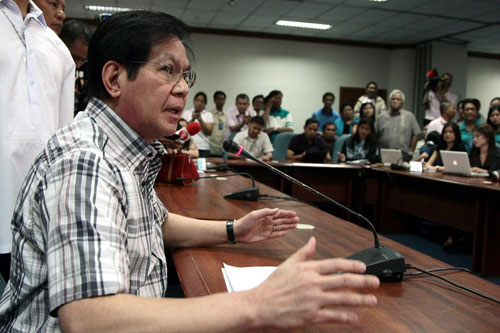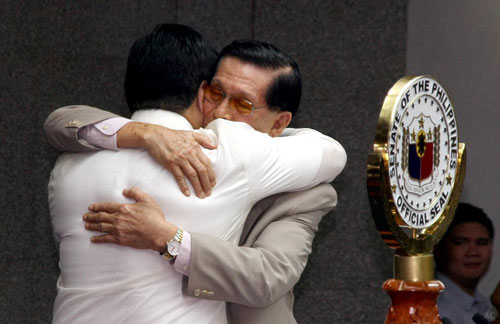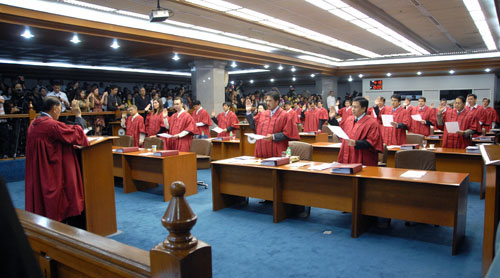The Senate had its fair share of excitement in 2011, including the return of three senators to the 23-member chamber and a flurry of inquiries, which catapulted several personalities to notoriety. In the first week of January, detained Sen. Senator Antonio Trillanes IV was given amnesty and joined the Senate the first time since he was elected in 2007. A former Navy officer, Trillanes had been detained since July 2003 for a failed attempt to overthrow the Arroyo administration. He became the first Philippine senator to be elected — in the May 2007 elections — while in detention. Among those who also returned to the Senate this year was Sen. Panfilo Lacson, who was a fugitive for more than a year to escape from what he claimed was a campaign of "political persecution" against him by the administration of former President Gloria Macapagal-Arroyo, of which he was a staunch critic.

Senator Panfilo Lacson gives his very first press conference at the Senate after coming out of hiding.
He returned to the country last March after the Court of Appeals ordered with finality that the arrest warrants against him be nullified, as well as the charges for his alleged involvement in the November 2000 killing of publicist Salvador "Bubby" Dacer and driver Emmanuel Corbito. The most shocking senatorial comeback, however, would probably be that of Sen. Koko
Pimentel, who was proclaimed only last August as the 12th winning senator in the 2007 polls. The Senate Electoral Tribunal issued the proclamation in favor of Pimentel after
Sen. Juan Miguel Zubiri, who was originally proclaimed as the 12th winning senator, resigned his seat last Aug. 3 amid mounting testimonies of alleged fraud during the 2007 elections. Pimentel, who was ranked 13th, had filed an electoral protest against Zubiri.

Former Senator Juan Miguel Zubiri hugs Senate President Juan Ponce Enrile after resigning from his post.
While the Senate regained three senators this year, it will soon lose another. On Dec. 13, Sen. Miriam
Defensor-Santiago was elected as a judge of the International Criminal Court (ICC), the independent body that prosecutes individuals for crimes against humanity and war crimes. Hers is somehow another comeback of sorts, for the feisty senator had lost her bid for a seat in the International Court of Justice (ICJ) in 2008. Santiago said she will have to move to The Hague in the Netherlands, where the ICC is based. She is set to take her oath in March 2012, but she won't have to resign from the Senate right away because the ICC probably won't summon her right away, the senator noted.
A storm of public hearings The Senate also managed to turn several personalities — subjects of a storm of public hearings — into household names. The inquiries, ranging from military corruption to controversial art exhibits, were usually heard by the blue ribbon committee. The longest-running Senate inquiry for 2011 was the probe of the controversial plea bargain deal involving accused plunderer and former military comptroller Ret. Gen. Carlos Garcia and the alleged corruption in the Armed Forces of the Philippines (AFP). It made famous former military comptroller Lt. Gen. Jacinto Ligot and his wife, Erlinda, who were
questioned on how they amassed more than P700 million and pricey realty in the United States. Ligot was the predecessor of Garcia, who is also being accused of amassing more than P300 million in state funds while in active service. The
Ligot couple was cited for contempt after they snubbed a Senate hearing and "falsely" reported that they were sick. Ligot was arrested but was eventually released. In the course of 10 hearings, whistleblower and former military fund manager Lt. Col. George Rabusa and other witnesses alleged that
former AFP chiefs of staff received around P5 million monthly during their term and millions in "pabaon" send-off money when they retired. He specifically accused former Defense chief Angelo Reyes of receiving around P100 million as AFP chief and at least P50 million more as send-off money when he retired in March 2001. Reyes denied the allegation and
filed before the Office of the Ombudsman criminal and administrative charges against Rabusa and Sen. Jinggoy Estrada, who brought the former fund manager to the Senate. More than a week later,
Reyes shot himself. On the other hand, the six-hearing inquiry into the donations by the Philippine Charity Sweepstakes Office (PCSO) turned several prelates who supposedly received vehicles from the government agency public figures. PCSO director Atty. Aleta Tolentino had earlier said that P6.9 million of their funds were allocated for the purchase of utility vehicles, supposedly for the Archdiocese of Cotabato, Zamboanga, Caritas Nueva Segovia, Basilan, and Butuan in 2009. The prelates were dubbed as the "Pajero bishops." It was later revealed, however, that the Church officials did not receive Pajeros but other sports utility vehicle brand that were supposedly used for their charity work and other missions. They
eventually returned the vehicles. The Senate, meanwhile, added to the fame of former First Gentleman Jose Miguel "Mike" Arroyo, accusing him and several Philippine National Police (PNP) officials of conspiring to pass off second-hand helicopters as brand new to the PNP in 2009. It also catapulted to fame Rowena del Rosario, a bookkeeper of the former Arroyo-owned firm LTA, who was also
cited for contempt and ordered arrested for supposedly being evasive in her answers and allegedly covering up for the Arroyo brothers. It took the senators five hearings before
recommending that Mr. Arroyo and other PNP officials be charged for violation of the Anti-Graft and Corrupt Practices Act and the Government Procurement Reform Act.
More to come But to think that the Senate has run out of subjects to investigate is far from the truth. The Senate is expected to continue its investigation into alleged behest loans granted by government banks to businessman Roberto Ongpin and the alleged fraud during the 2004 and 2007 elections. The Senate blue ribbon and banks and financial institution committees already held five hearings into the behest loans issue, with Sen. Sergio
Osmeña III alleging that Ongpin was guilty of insider trading when he sold shares using loans from the Development Bank of the Philippines. The senator said they will next look into the possibility of price manipulation. On the other hand, the Senate blue ribbon and electoral reforms committees have already held three hearings on the poll fraud issue during which several witnesses have confirmed Mrs. Arroyo supposedly ordered Maguindanao Gov. Andal Ampatuan Sr. to ensure the victory of administration senatorial bets in the province in the 2007 elections. Sen. Francis Escudero had said that they plan to look into the masterminds behind the Garci tapes, which refer to alleged wiretapped conversations about vote rigging between a woman presumed to be Mrs. Arroyo and a man presumed to be former elections commissioner Virgilio Garcillano. Apart from the investigation hearings, the Senate also passed several laws this year, four of which were legislations prioritized the Aquino administration. Among the legislations that were passed by the Senate in 2011 are:
- Republic Act No. 10148 (An Act Granting Philippine Citizenship to Marcus Eugene Douthit) — Lapsed into Law
- Republic Act No. 10149 (An Act to Promote Financial Viability and Fiscal Discipline in Government-Owned or Controlled Corporations and to Strengthen the Role of the State in its Governance and Management to Make Them More Responsive to the Needs of Public Interest and for Other Purposes)
- Republic Act No. 10150 (An Act Extending the Implementation of the Lifeline Rate, Amending for the Purpose Section 73 of the Republic Act N0. 9136)
- Republic Act No. 10151 (An Act Allowing the Employment of Night Workers, Thereby Repealing Articles 130 and 131 of Presidential Decree No. 442)
- Republic Act No. 10152 (An Act Providing for Mandatory Basic Immunization Services for Infants and Children, Repealing for the Purpose Presidential Decree No. 996)
- Republic Act No. 10153 (An Act Providing for the Synchronization of the Elections in the Autonomous Region in Muslim Mindanao (ARMM) with the National and Local Elections, and for Other Purposes)
- Republic Act No. 10154 (An Act Requiring All Concerned Government Agencies to Ensure the Early Release of the Retirement Pay, Pensions, Gratuities and Other Benefits of Retiring Government Employees)
2012 General Appropriations Act In his adjournment speech, Senate President Juan Ponce Enrile said he was proud that they managed to pass several priority legislations, especially the General Appropriations Act which they passed even earlier than last year’s GAA. "Looking back, I can proudly say that our hard work for the past six months, especially the Senate's very early passage of the national budget for 2012, is our best gift to our people," he said. "We, as legislators, do not aim to pass laws that will affect or influence not only this present generation but the coming generations as well. Mindful of this, we strive to craft pieces of legislation that will bring and help maintain order in society, address our people's socio-economic needs, meet their desire for financial security and their dream of healthy and well-educated children," he added. The controversial Reproductive Health and Freedom of Information bills are still pending. Enrile said he expects to pass them on second and third reading when the Senate resumes session next year.
Corona impeachment The Senate president said they still have "more serious and challenging work" ahead of them, specifically the impeachment trial of Chief Justice Corona. "As you all know, we received... the verified complaint for the impeachment of the Chief Justice of the Supreme Court. We will be more than ready to [act as an impeachment court] when we convene in January next year," he said.

Senate convenes as impeachment court. Senators take oath as judges in the impeachment of Supreme Court Justice Renato Corona.
The Senate, sitting as an impeachment court, is expected to resume session on Jan. 16 but the trial proper is expected to begin later. Early this year, the senators were also supposed to sit as judges in the impeachment trial of former Ombudsman Merceditas
Gutierrez who resigned on April 29, or 10 days before the chamber started hearing her case.
— VS, GMA News Photos courtesy of the Senate official website 





